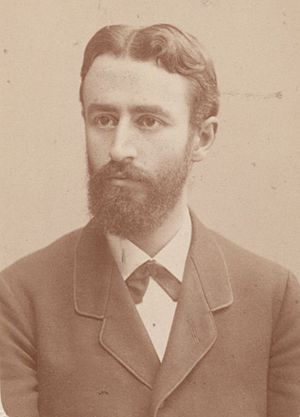Alfred Hettner facts for kids
Quick facts for kids
Alfred Hettner
|
|
|---|---|
 |
|
| Born | August 6, 1859 |
| Died | August 31, 1941 (aged 82) |
| Alma mater | University of Strasbourg |
| Known for | Chorological approach to geography; fieldwork in Colombia and Chile. |
| Scientific career | |
| Institutions | Heidelberg University (1899-1928) |
| Doctoral students | Martha Krug-Genthe, Oskar Schmieder, Friedrich Metz (de), Heinrich Schmitthenner (de) |
| Influences | Ferdinand von Richthofen, Friedrich Ratzel |
| Influenced | Carl O. Sauer, Richard Hartshorne |
Alfred Hettner (born August 6, 1859, in Dresden; died August 31, 1941, in Heidelberg) was an important German geographer. He is famous for his idea of chorology. This is a way of studying places and regions. His work greatly influenced other geographers like Carl O. Sauer and Richard Hartshorne. Besides studying the geography of Europe, he also did fieldwork in Colombia, Chile, and Russia.
Contents
Early Life and Education
Alfred Hettner was born in Dresden. His father was Hermann Theodor Hettner, an art historian. Alfred studied at the University of Strasbourg, where he earned his PhD. He also learned from well-known geographers, Ferdinand von Richthofen and Friedrich Ratzel, at Leipzig University.
Hettner's View on Geography
Alfred Hettner believed that geography is a "chorological science." This means it focuses on studying regions. He thought that geography should look at both unique things in a region (regional geography) and general things that apply everywhere (general geography). However, he felt that studying regions, especially through his Länderkunde approach, was the most important part of geography.
He also guided many students who were getting their PhDs. Some of his students included Martha Krug-Genthe, Oskar Schmieder, Friedrich Metz, and Heinrich Schmitthenner.
Career and Contributions
In 1895, Alfred Hettner started a journal called Geographische Zeitschrift (Geographical Journal). He was the editor of this journal for many years. He taught for a short time at the University of Tübingen (1894-1897) and Leipzig University (1897-1899).
In 1899, he joined the Heidelberg University as a professor. By 1906, he became the first head of the Geography department at Heidelberg. He stayed in this position until he retired in 1928. One of his important books, Europe, was published in 1907.
Literary works
- Methodische Zeit- und Streitfragen, in: Geographische Zeitschrift, Bd. 29 (1923), S. 49-50
- Die Geographie, ihre Geschichte, ihr Wesen und ihre Methoden, Breslau, 1927
See also
 In Spanish: Alfred Hettner para niños
In Spanish: Alfred Hettner para niños
 | Stephanie Wilson |
 | Charles Bolden |
 | Ronald McNair |
 | Frederick D. Gregory |

